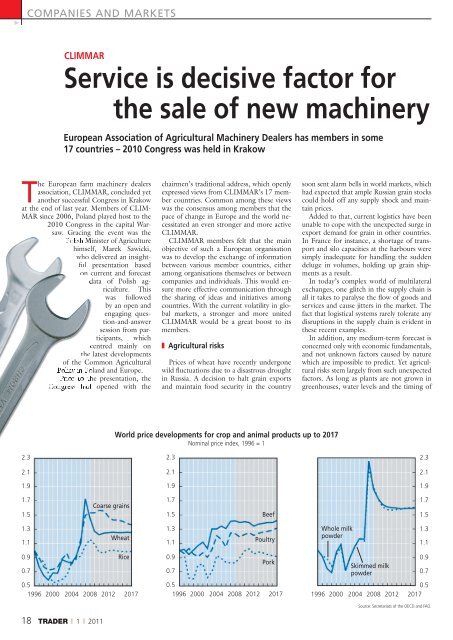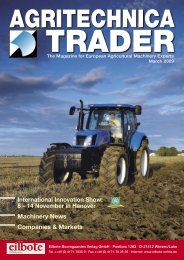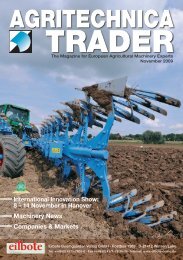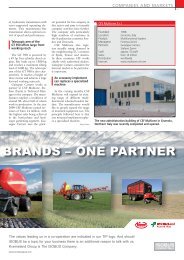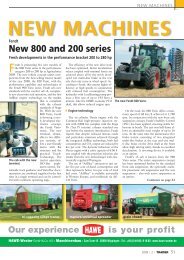Titel-Trader 1.2011.indd - Agritechnica Trader
Titel-Trader 1.2011.indd - Agritechnica Trader
Titel-Trader 1.2011.indd - Agritechnica Trader
Create successful ePaper yourself
Turn your PDF publications into a flip-book with our unique Google optimized e-Paper software.
COMPANIES AND MARKETS<br />
CLIMMAR<br />
18 TRADER | 1 | 2011<br />
Service is decisive factor for<br />
the sale of new machinery<br />
The European farm machinery dealers<br />
association, CLIMMAR, concluded yet<br />
another successful Congress in Krakow<br />
at the end of last year. Members of CLIM-<br />
MAR since 2006, Poland played host to the<br />
2010 Congress in the capital Warsaw.<br />
Gracing the event was the<br />
Polish Minister of Agriculture<br />
himself, Marek Sawicki,<br />
who delivered an insightful<br />
presentation based<br />
on current and forecast<br />
data of Polish agriculture.<br />
This<br />
was followed<br />
by an open and<br />
engaging question-and-answer<br />
session from participants,<br />
which<br />
centred mainly on<br />
the latest developments<br />
of the Common Agricultural<br />
Policy in Poland and Europe.<br />
Prior to the presentation, the<br />
Congress had opened with the<br />
2.3<br />
2.1<br />
1.9<br />
1.7<br />
1.5<br />
1.3<br />
1.1<br />
0.9<br />
0.7<br />
European Association of Agricultural Machinery Dealers has members in some<br />
17 countries – 2010 Congress was held in Krakow<br />
Coarse grains<br />
0.5<br />
1996 2000 2004 2008 2012 2017<br />
chairmen’s traditional address, which openly<br />
expressed views from CLIMMAR’s 17 member<br />
countries. Common among these views<br />
was the consensus among members that the<br />
pace of change in Europe and the world necessitated<br />
an even stronger and more active<br />
CLIMMAR.<br />
CLIMMAR members felt that the main<br />
objective of such a European organisation<br />
was to develop the exchange of information<br />
between various member countries, either<br />
among organisations themselves or between<br />
companies and individuals. This would ensure<br />
more effective communication through<br />
the sharing of ideas and initiatives among<br />
countries. With the current volatility in global<br />
markets, a stronger and more united<br />
CLIMMAR would be a great boost to its<br />
members.<br />
Agricultural risks<br />
Prices of wheat have recently undergone<br />
wild fl uctuations due to a disastrous drought<br />
in Russia. A decision to halt grain exports<br />
and maintain food security in the country<br />
World price developments for crop and animal products up to 2017<br />
Nominal price index, 1996 = 1<br />
Wheat<br />
Rice<br />
2.3<br />
2.1<br />
1.9<br />
1.7<br />
1.5<br />
1.3<br />
1.1<br />
0.9<br />
0.7<br />
Beef<br />
Poultry<br />
Pork<br />
0.5<br />
1996 2000 2004 2008 2012 2017<br />
soon sent alarm bells in world markets, which<br />
had expected that ample Russian grain stocks<br />
could hold off any supply shock and maintain<br />
prices.<br />
Added to that, current logistics have been<br />
unable to cope with the unexpected surge in<br />
export demand for grain in other countries.<br />
In France for instance, a shortage of transport<br />
and silo capacities at the harbours were<br />
simply inadequate for handling the sudden<br />
deluge in volumes, holding up grain shipments<br />
as a result.<br />
In today’s complex world of multilateral<br />
exchanges, one glitch in the supply chain is<br />
all it takes to paralyse the fl ow of goods and<br />
services and cause jitters in the market. The<br />
fact that logistical systems rarely tolerate any<br />
disruptions in the supply chain is evident in<br />
these recent examples.<br />
In addition, any medium-term forecast is<br />
concerned only with economic fundamentals,<br />
and not unknown factors caused by nature<br />
which are impossible to predict. Yet agricultural<br />
risks stem largely from such unexpected<br />
factors. As long as plants are not grown in<br />
greenhouses, water levels and the timing of<br />
Whole milk<br />
powder<br />
2.3<br />
2.1<br />
1.9<br />
1.7<br />
1.5<br />
1.3<br />
1.1<br />
Skimmed milk<br />
powder<br />
0.9<br />
0.7<br />
0.5<br />
1996 2000 2004 2008 2012 2017<br />
Source: Secretariats of the OECD and FAO.


